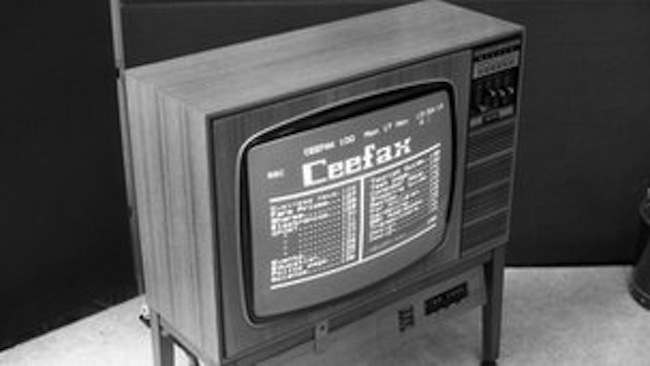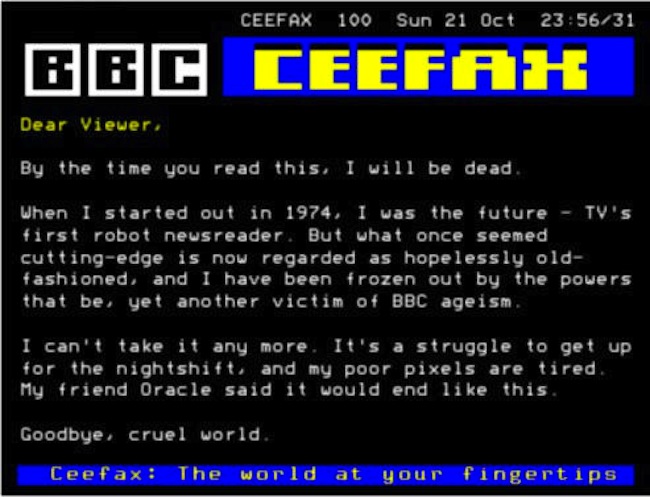Posts Tagged ‘ceefax’
Farewell Ceefax: How Internet killed the television star
FAREWELL then, Ceefax; your Legoland graphics will delight and inform us no more. You were called Ceefax, because you enabled viewers “see the facts” with no messing about, and you became a national institution. But your birth was a happy accident.
As BBC engineers searched for a way to provide programme subtitles, they realised the same technology could be used to send other information.
Colin McIntyre led a team of eight at Television Centre in Shepherd’s Bush, monitoring the news wires. They typed up the stories, then produced a punched tape which was “read” by a machine into a “core store” with a maximum capacity of just 24 pages.
Read the rest of this entry »
Posted: 31st, October 2012 | In: Flashback, Key Posts, TV & Radio | Comment
Ceefax and Teletext RIP
BEFORE the internet, there was a whole world of information to be found on Ceefax and Teletext. These blocky, but comfortingly amateurish graphics would adorn our pages with TV listings, horoscopes, music news and games. Bamboozle is surely one of the first interactive games a generation played? Channel 4 had Planet Sound, with John Earls heading up the editorial and providing a trusted, fanzine-style voice which music fans would devour with their Coco Pops on their TVs previously meant only for their Spectrums and Commodore 64s.
The BBC’s Ceefax was a little more safe than what could be found on other channels, but by no means loved any less.
Even though the whole thing looked hopelessly out of date in an age where video games are hyper-real and the internet is the place filled with every kind of graphic and photo you could hope for, there’s elements of Ceefax and Teletext that haven’t been bettered.
For example, the Now And Next (p120 or p606) television guide feature was a thing of wonder, minimising itself at the foot of the screen, allowing you to continue to watch television while weighing up which channel to hop to. And of course, subtitling was a glorious leap forward, with captioning on Freeview and Sky basically copying what Ceefax had done before.
For many, Teletext and Ceefax won’t mean a thing, but for that generation that truly embraced it, its passing should bring back a host of memories. Pressing ‘reveal’ on pages with no answer was always a thing people did, revealing stray code and such. Then there was the button which allowed you to enter a four number code, rather than the usual three. Stoners and the bored would endlessly tap in random digits in a bid to find secret pages. And this writer DID, and it appeared to be something to do with a premium rate phone game, regrettably.
It goes without saying that this old technology had to go, surpassed by the infinitely more useful internet. Smartphones and tablets effectively made Ceefax redundant. But that’s not to say we shouldn’t pay small tribute. After all, if it wasn’t for Nightscreen and the like, many of us would never have heard any jazz or muzak, ever.
Read the rest of this entry »
Posted: 23rd, October 2012 | In: Key Posts, TV & Radio | Comment



